初三英语一对一时态专题(1)
- 格式:doc
- 大小:60.00 KB
- 文档页数:3
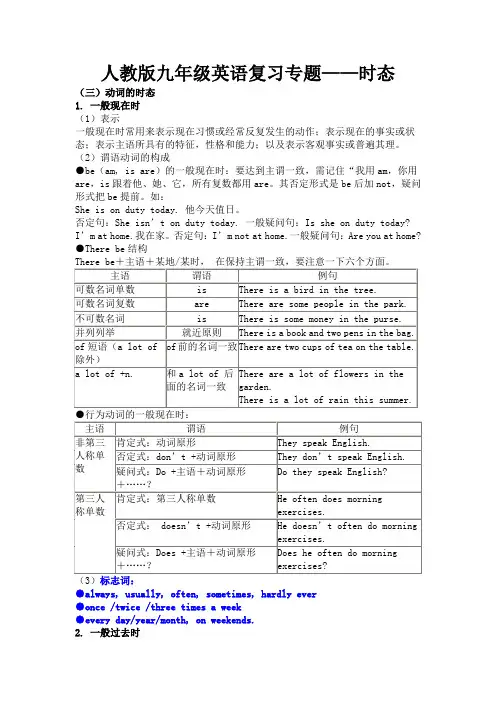
人教版九年级英语复习专题——时态(三)动词的时态1. 一般现在时(1)表示一般现在时常用来表示现在习惯或经常反复发生的动作;表示现在的事实或状态;表示主语所具有的特征,性格和能力;以及表示客观事实或普遍其理。
(2)谓语动词的构成●be(am, is are)的一般现在时:要达到主谓一致,需记住“我用am,你用are,is跟着他、她、它,所有复数都用are。
其否定形式是be后加not,疑问形式把be提前。
如:She is on duty today. 他今天值日。
否定句:She isn’t o n duty today. 一般疑问句:Is she on duty today? I’m at home.我在家。
否定句:I’m not at home.一般疑问句:Are you at home?●There be结构There be+主语+某地/某时,在保持主谓一致,要注意一下六个方面。
主语谓语例句可数名词单数is There is a bird in the tree.可数名词复数are There are some people in the park.不可数名词is There is some money in the purse.并列列举就近原则There is a book and two pens in the bag. of短语(a lot of除外)of前的名词一致There are two cups of tea on the table.a lot of +n. 和a lot of 后面的名词一致There are a lot of flowers in the garden.There is a lot of rain this summer.●行为动词的一般现在时:主语谓语例句非第三人称单数肯定式:动词原形They speak English.否定式:don’t +动词原形They don’t speak English.疑问式:Do +主语+动词原形+……?Do they speak English?第三人称单数肯定式:第三人称单数He often does morningexercises.否定式:doesn’t +动词原形He doesn’t often do morningexercises.疑问式:Does +主语+动词原形+……?Does he often do morningexercises?(3)标志词:●always, usually, often, sometimes, hardly ever ●once /twice /three times a week●every day/year/month, on weekends.2. 一般过去时(1)表示一般过去时表示过去发生的动作或存在的状态;或表示过去一段时间经常或反复发生的动作。
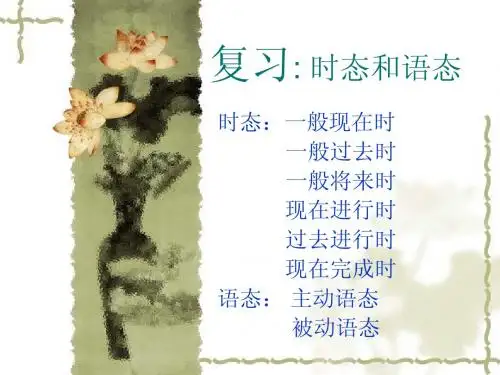
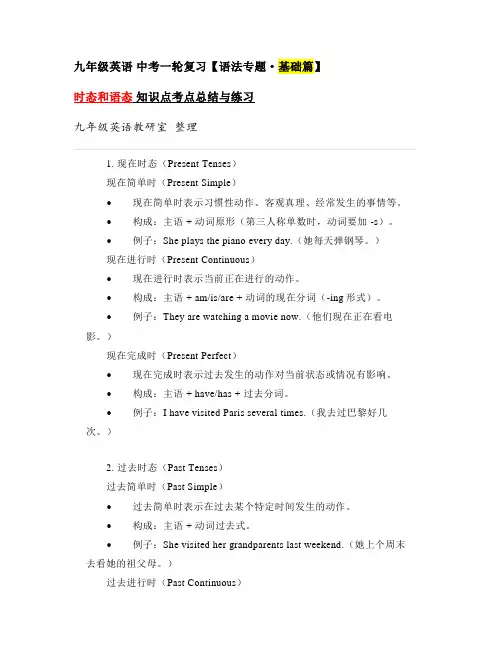
九年级英语中考一轮复习【语法专题·基础篇】时态和语态知识点考点总结与练习九年级英语教研室整理1. 现在时态(Present Tenses)现在简单时(Present Simple)•现在简单时表示习惯性动作、客观真理、经常发生的事情等。
•构成:主语 + 动词原形(第三人称单数时,动词要加 -s)。
•例子:She plays the piano every day.(她每天弹钢琴。
)现在进行时(Present Continuous)•现在进行时表示当前正在进行的动作。
•构成:主语 + am/is/are + 动词的现在分词(-ing形式)。
•例子:They are watching a movie now.(他们现在正在看电影。
)现在完成时(Present Perfect)•现在完成时表示过去发生的动作对当前状态或情况有影响。
•构成:主语 + have/has + 过去分词。
•例子:I have visited Paris several times.(我去过巴黎好几次。
)2. 过去时态(Past Tenses)过去简单时(Past Simple)•过去简单时表示在过去某个特定时间发生的动作。
•构成:主语 + 动词过去式。
•例子:She visited her grandparents last weekend.(她上个周末去看她的祖父母。
)过去进行时(Past Continuous)•过去进行时表示过去某一时刻正在进行的动作。
•构成:主语 + was/were + 动词的现在分词(-ing形式)。
•例子:They were playing soccer when it started raining.(当雨开始下时,他们正在踢足球。
)过去完成时(Past Perfect)•过去完成时表示在过去某个时间点之前已经完成的动作。
•构成:主语 + had + 过去分词。
•例子:By the time I arrived, they had already eaten dinner.(我到达时,他们已经吃完晚饭了。
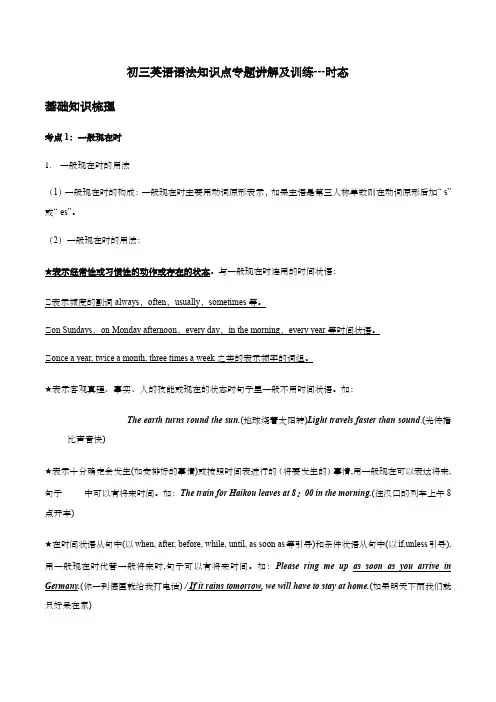
初三英语语法知识点专题讲解及训练---时态基础知识梳理考点1:一般现在时1.一般现在时的用法(1)一般现在时的构成:一般现在时主要用动词原形表示,如果主语是第三人称单数则在动词原形后加“-s”或“-es”。
(2)一般现在时的用法:★表示经常性或习惯性的动作或存在的状态。
与一般现在时连用的时间状语:※表示频度的副词always,often,usually,sometimes等。
※on Sundays,on Monday afternoon,every day,in the morning,every year等时间状语。
※once a year, twice a month, three times a week之类的表示频率的词组。
★表示客观真理、事实、人的技能或现在的状态时句子里一般不用时间状语。
如:The earth turns round the sun.(地球绕着太阳转)Light travels faster than sound.(光传播比声音快)★表示十分确定会发生(如安排好的事情)或按照时间表进行的(将要发生的)事情,用一般现在可以表达将来,句子中可以有将来时间。
如:The train for Haikou leaves at 8:00 in the morning.(往汉口的列车上午8点开车)★在时间状语从句中(以when, after, before, while, until, as soon as等引导)和条件状语从句中(以if,unless引导),用一般现在时代替一般将来时,句子可以有将来时间。
如:Please ring me up as soon as you arrive in Germany.(你一到德国就给我打电话) / If it rains tomorrow, we will have to stay at home.(如果明天下雨我们就只好呆在家)★一般现在时用于倒装句中可以表示正在发生的动作,动词以come, go为主。
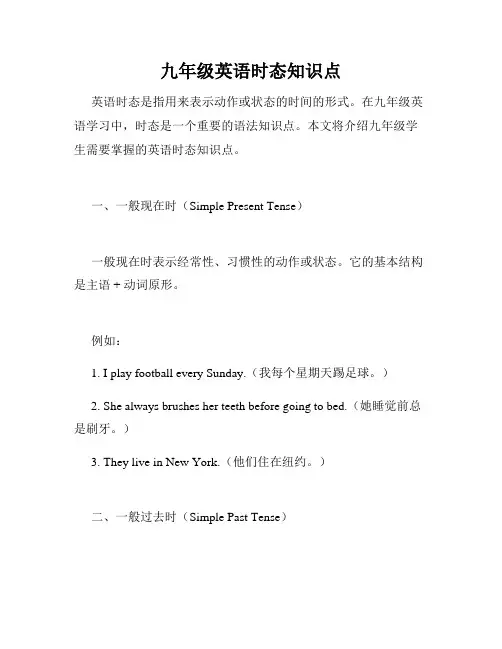
九年级英语时态知识点英语时态是指用来表示动作或状态的时间的形式。
在九年级英语学习中,时态是一个重要的语法知识点。
本文将介绍九年级学生需要掌握的英语时态知识点。
一、一般现在时(Simple Present Tense)一般现在时表示经常性、习惯性的动作或状态。
它的基本结构是主语 + 动词原形。
例如:1. I play football every Sunday.(我每个星期天踢足球。
)2. She always brushes her teeth before going to bed.(她睡觉前总是刷牙。
)3. They live in New York.(他们住在纽约。
)二、一般过去时(Simple Past Tense)一般过去时表示过去发生的具体的动作或状态。
它的基本结构是主语 + 动词过去式。
例如:1. They watched a movie last night.(他们昨晚看了电影。
)2. I lived in Beijing when I was young.(我年轻时住在北京。
)3. She bought a new dress yesterday.(她昨天买了一条新裙子。
)三、一般将来时(Simple Future Tense)一般将来时表示将来要发生的动作或状态。
它的基本结构是主语 + will + 动词原形。
例如:1. I will visit my grandparents next weekend.(下个周末我会去看望我的祖父母。
)2. She will take the train to Shanghai.(她将坐火车去上海。
)3. They will have a party on Friday.(他们将在星期五举办一个派对。
)四、现在进行时(Present Continuous Tense)现在进行时表示正在进行的动作。
它的基本结构是主语 +am/is/are + 动词-ing 形式。
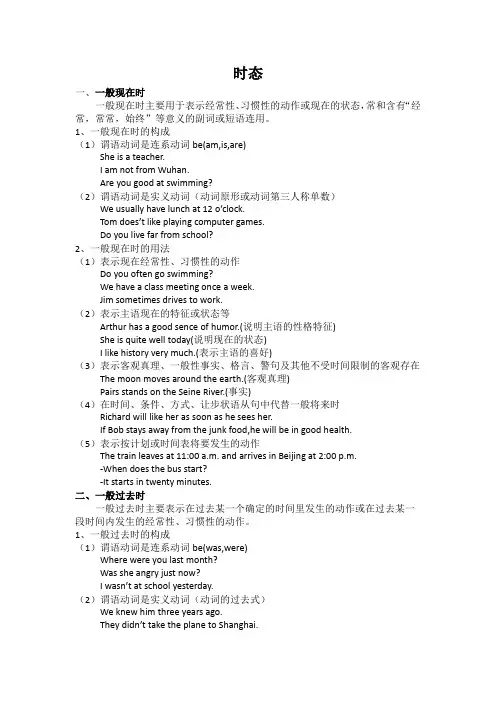
时态一、一般现在时一般现在时主要用于表示经常性、习惯性的动作或现在的状态,常和含有“经常,常常,始终”等意义的副词或短语连用。
1、一般现在时的构成(1)谓语动词是连系动词be(am,is,are)She is a teacher.I am not from Wuhan.Are you good at swimming?(2)谓语动词是实义动词(动词原形或动词第三人称单数)We usually have lunch at 12 o’clock.Tom does’t like playing computer games.Do you live far from school?2、一般现在时的用法(1)表示现在经常性、习惯性的动作Do you often go swimming?We have a class meeting once a week.Jim sometimes drives to work.(2)表示主语现在的特征或状态等Arthur has a good sence of humor.(说明主语的性格特征)She is quite well today(说明现在的状态)I like history very much.(表示主语的喜好)(3)表示客观真理、一般性事实、格言、警句及其他不受时间限制的客观存在The moon moves around the earth.(客观真理)Pairs stands on the Seine River.(事实)(4)在时间、条件、方式、让步状语从句中代替一般将来时Richard will like her as soon as he sees her.If Bob stays away from the junk food,he will be in good health.(5)表示按计划或时间表将要发生的动作The train leaves at 11:00 a.m. and arrives in Beijing at 2:00 p.m.-When does the bus start?-It starts in twenty minutes.二、一般过去时一般过去时主要表示在过去某一个确定的时间里发生的动作或在过去某一段时间内发生的经常性、习惯性的动作。
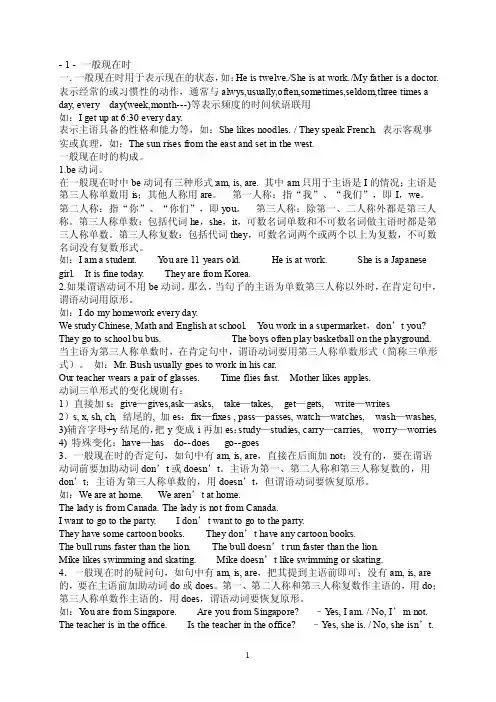
- 1 - 一般现在时一.一般现在时用于表示现在的状态,如:He is twelve./She is at work./My father is a doctor. 表示经常的或习惯性的动作,通常与alwys,usually,often,sometimes,seldom,three times a day, every day(week,month---)等表示频度的时间状语联用如:I get up at 6:30 every day.表示主语具备的性格和能力等,如:She likes noodles. / They speak French. 表示客观事实或真理,如:The sun rises from the east and set in the west.一般现在时的构成。
1.be动词。
在一般现在时中be动词有三种形式:am, is, are. 其中am只用于主语是I的情况;主语是第三人称单数用is;其他人称用are。
第一人称:指“我”、“我们”,即I,we。
第二人称:指“你”、“你们”,即you。
第三人称:除第一、二人称外都是第三人称。
第三人称单数:包括代词he,she,it,可数名词单数和不可数名词做主语时都是第三人称单数。
第三人称复数:包括代词they,可数名词两个或两个以上为复数,不可数名词没有复数形式。
如:I am a student. Y ou are 11 years old. He is at work. She is a Japanese girl. It is fine today. They are from Korea.2.如果谓语动词不用be动词。
那么,当句子的主语为单数第三人称以外时,在肯定句中,谓语动词用原形。
如:I do my homework every day.We study Chinese, Math and English at school. Y ou work in a supermarket,don’t you? They go to school bu bus. The boys often play basketball on the playground. 当主语为第三人称单数时,在肯定句中,谓语动词要用第三人称单数形式(简称三单形式)。
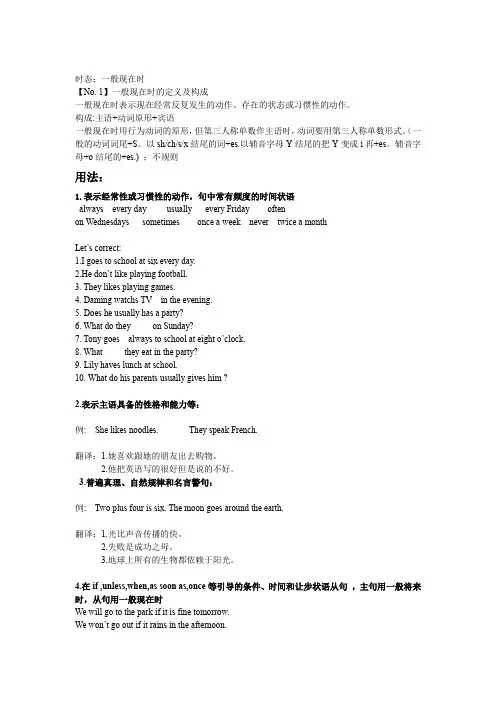
时态:一般现在时【No. 1】一般现在时的定义及构成一般现在时表示现在经常反复发生的动作、存在的状态或习惯性的动作。
构成:主语+动词原形+宾语一般现在时用行为动词的原形,但第三人称单数作主语时,动词要用第三人称单数形式。
(一般的动词词尾+S。
以sh/ch/s/x结尾的词+es.以辅音字母Y结尾的把Y变成i再+es。
辅音字母+o结尾的+es.) ;不规则用法:1.表示经常性或习惯性的动作,句中常有频度的时间状语always every day usually every Friday oftenon Wednesdayssometimes once a week never twice a monthLet’s correct:1.I goes to school at six every day.2.He don’t like playing football.3. They likes playing games.4. Daming watchs TV in the evening.5. Does he usually has a party?6. What do they on Sunday?7. Tony goes always to school at eight o’clock.8. What they eat in the party?9. Lily haves lunch at school.10. What do his parents usually gives him ?2.表示主语具备的性格和能力等:例: She likes noodles.They speak French.翻译:1.她喜欢跟她的朋友出去购物。
2.他把英语写的很好但是说的不好。
3.普遍真理、自然规律和名言警句:例: Two plus four is six. The moon goes around the earth.翻译:1.光比声音传播的快。
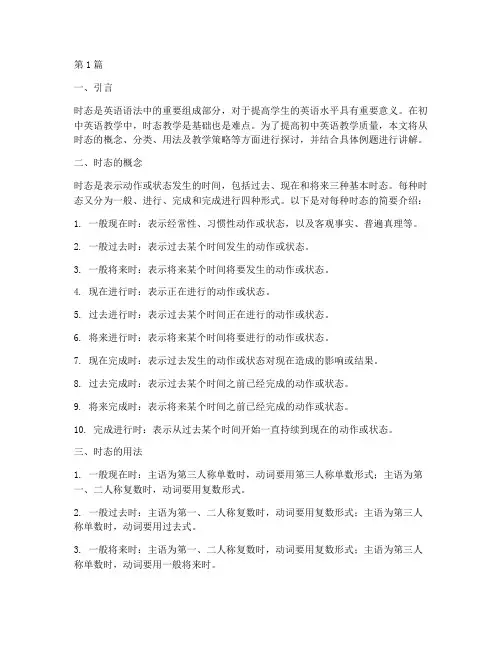
第1篇一、引言时态是英语语法中的重要组成部分,对于提高学生的英语水平具有重要意义。
在初中英语教学中,时态教学是基础也是难点。
为了提高初中英语教学质量,本文将从时态的概念、分类、用法及教学策略等方面进行探讨,并结合具体例题进行讲解。
二、时态的概念时态是表示动作或状态发生的时间,包括过去、现在和将来三种基本时态。
每种时态又分为一般、进行、完成和完成进行四种形式。
以下是对每种时态的简要介绍:1. 一般现在时:表示经常性、习惯性动作或状态,以及客观事实、普遍真理等。
2. 一般过去时:表示过去某个时间发生的动作或状态。
3. 一般将来时:表示将来某个时间将要发生的动作或状态。
4. 现在进行时:表示正在进行的动作或状态。
5. 过去进行时:表示过去某个时间正在进行的动作或状态。
6. 将来进行时:表示将来某个时间将要进行的动作或状态。
7. 现在完成时:表示过去发生的动作或状态对现在造成的影响或结果。
8. 过去完成时:表示过去某个时间之前已经完成的动作或状态。
9. 将来完成时:表示将来某个时间之前已经完成的动作或状态。
10. 完成进行时:表示从过去某个时间开始一直持续到现在的动作或状态。
三、时态的用法1. 一般现在时:主语为第三人称单数时,动词要用第三人称单数形式;主语为第一、二人称复数时,动词要用复数形式。
2. 一般过去时:主语为第一、二人称复数时,动词要用复数形式;主语为第三人称单数时,动词要用过去式。
3. 一般将来时:主语为第一、二人称复数时,动词要用复数形式;主语为第三人称单数时,动词要用一般将来时。
4. 现在进行时:主语为第一、二人称复数时,动词要用复数形式;主语为第三人称单数时,动词要用现在进行时。
5. 过去进行时:主语为第一、二人称复数时,动词要用复数形式;主语为第三人称单数时,动词要用过去进行时。
6. 将来进行时:主语为第一、二人称复数时,动词要用复数形式;主语为第三人称单数时,动词要用将来进行时。
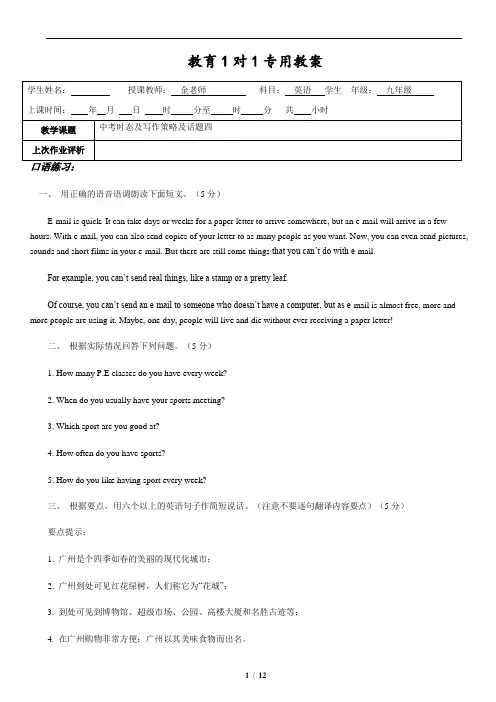
教育1对1专用教案一、用正确的语音语调朗读下面短文。
(5分)E-mail is quick. It can take days or weeks for a paper letter to arrive somewhere, but an e-mail will arrive in a few hours. With e-mail, you can also send copies of your letter to as many people as you want. Now, you can even send pictures, sounds and short films in your e-mail. But there are still some things that you can’t do with e-mail.For example, you can’t send real things, like a stamp or a pretty leaf.Of course, you can’t send an e-mail to someone who doesn’t have a computer, but as e-mail is almost free, more and more people are using it. Maybe, one day, people will live and die without ever receiving a paper letter!二、根据实际情况回答下列问题。
(5分)1. How many P.E classes do you have every week?2. When do you usually have your sports meeting?3. Which sport are you good at?4. How often do you have sports?5. How do you like having sport every week?三、根据要点,用六个以上的英语句子作简短说话。
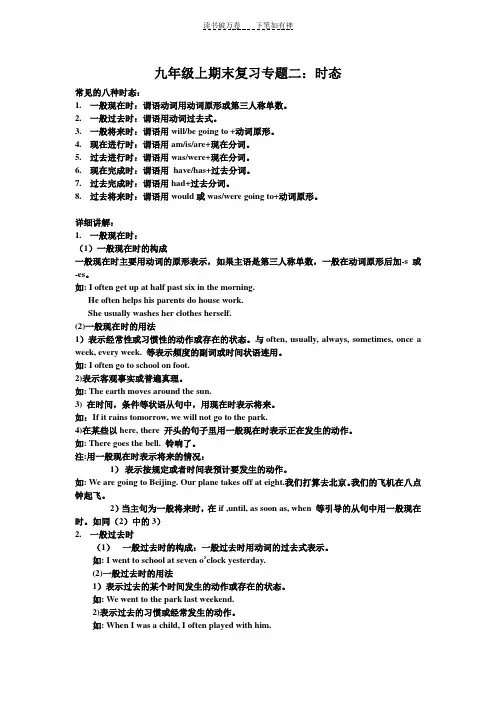
九年级上期末复习专题二:时态常见的八种时态:1.一般现在时:谓语动词用动词原形或第三人称单数。
2.一般过去时:谓语用动词过去式。
3.一般将来时:谓语用will/be going to +动词原形。
4.现在进行时:谓语用am/is/are+现在分词。
5.过去进行时:谓语用was/were+现在分词。
6.现在完成时:谓语用have/has+过去分词。
7.过去完成时:谓语用had+过去分词。
8.过去将来时:谓语用would或was/were going to+动词原形。
详细讲解:1.一般现在时:(1)一般现在时的构成一般现在时主要用动词的原形表示,如果主语是第三人称单数,一般在动词原形后加-s或-es。
如: I often get up at half past six in the morning.He often helps his parents do house work.She usually washes her clothes herself.(2)一般现在时的用法1)表示经常性或习惯性的动作或存在的状态。
与often, usually, always, sometimes, once a week, every week. 等表示频度的副词或时间状语连用。
如: I often go to school on foot.2)表示客观事实或普遍真理。
如: The earth moves around the sun.3) 在时间,条件等状语从句中,用现在时表示将来。
如:If it rains tomorrow, we will not go to the park.4)在某些以here, there 开头的句子里用一般现在时表示正在发生的动作。
如: There goes the bell. 铃响了。
注:用一般现在时表示将来的情况:1)表示按规定或者时间表预计要发生的动作。
如: We are going to Beijing. Our plane takes off at eight.我们打算去北京。
一、选择题1.This kink of milk________ well . It________ out soon.A.is sold, sells B.sells; is sold C.is sold, will be sold D.sells, will be sold 2.—Will your younger cousin go for a picnic this Children’s Day?—If I don’t go, ________.A.so does he B.so will he C.neither does he D.neither will he 3.My parents in Hong Kong. They were born there and have never lived anywhere else. A.live B.livedC.were living D.will live4.—Could you tell me ________? I must find him.—Sorry, I have no idea. But he was here just now.A.where Tom was B.where has Tom goneC.where can I find Tom D.where Tom is5.—How do you like that movie?—I think the second half ________ more exciting.A.is B.are C.was D.were6.—There are so many swimmers swimming in the swimming pool.—Yes, and sixty percent _ children.A.is B.are C.was D.were7.Not only my classmates but also our English teacher Chinese poems, so we often share their favourite ones.A.like B.liked C.likes D.liking8.People more chances to receive good health care than they used to, and they're living longer as a result.A.will have B.have C.had D.were having9.--- Do you know what time Daniel Xuzhou tomorrow?---At 2:00 p. m. I will meet him when he at the airport.A.gets to; arrives B.will get to; will arriveC.will get to; arrives D.gets to; will arrive10.—The football match is coming. I’m not sure if it will rain tomorrow.— If it tomorrow, we’ll put off the match.A.will rain B.is raining C.rains D.rain11.--- Do you like the new pen?--- Yes, it _______ very well.A.is written B.writes C.is writing D.has written 12.Temperatures________ quite dramatically at night in mountains, so put on some warm clothes before going out.A.are dropped B.dropC.are being dropped D.have dropped13.— How much are the two pairs of trousers?— They are not expensive. I think one hundred dollars ______ enough.A.is B.are C.were D.was14.You’d better write down her address before you ________ it.A.forget B.are forgettingC.forgot D.will forget15.Jenny who I ________ to know in Australia has worked in China for a year already. We are going to meet next week.A.has got B.will get C.got D.get16.— Jenny, why do you look so tired today?—I didn’t sleep well. Because I _________ for my dad to come back for three hours. A.waited B.have waited C.am waiting D.was waiting 17.— Uncle Sam, I have to leave right now.— What a pity! I ________ you could stay a little longer with us.A.think B.am thinking C.thought D.will think 18.—I know Lisa is your best friend. Do you see much of each other now?—No! She ________ in New York for ten years, but now she lives in Los Angeles.A.lives B.has lived C.lived D.is living 19.— Have you heard of Yangzhou Horticultural Expo? It is showing gardens around the world.— Yes. I ________ it with my parents the other day.A.visit B.visited C.will visit D.have visited 20.—Linda is not coming for the party tonight.—But she __________.A.promises B.promised C.will promise D.had promised 21.— Mar k’s car ________ a cloud of dust as he drove off.—That’s why we dislike him at all.A.raised B.rose C.was raised D.was rising 22.—Why hasn’t anyone come to the party?— Oh, my god! I ______ the wrong date in the invitation letters the other day.A.wrote B.have written C.will write D.write 23.—Sorry, I’m afraid Dr. Johnson isn’t at his office now.—Well, I ________ him on his mobile phone instead.A.called B.have called C.will call D.is calling 24.— What a pity that Kobe Bryant has died in a terrible accident!— Yes. But the work he has done ________ encouraging us.A.will keep B.would keep C.has kept D.had kept 25.The food cooked the day before yesterday ______ bad. Throw it away.A.is smelt terrible B.is smelt terribly C.smells terribly D.smells terrible 26.If you have any question, please ______ free to contact me at sue_smith@.A.to feel B.feeling C.feel D.felt27.The fact that so many people still smoke in public places____ that we may need a nationwide campaign to raise awareness of the risks of smoking.A.suggest B.suggests C.suggested D.suggesting 28.I want to buy that kind of cloth because I_____the cloth_____well.A.have told;washed B.have been told;washesC.have been told;washed D.was told;washes29.Please pay attention because this information__________ all of you.A.is concerned about B.concerns C.will be concerned D.is concerning 30.The school in library my mother works in the east of the village.A.whose;lies B.which;lay C.which;lies D.which;lying 31.With the application of 5G technology __________ profound changes in almost all fields throughout the world.A.will come B.are coming C.comes D.come32.— Do you like the skirt?— It _______ soft.A.is feeling B.feltC.feels D.is felt33.We’ll go to play w ith snow if it ______ tomorrow.A.snow B.snowsC.will snow D.snowed34.The palace caught fire three times in the last century, and little of the original building________ now.A.is remained B.is remainingC.remains D.has been remained35.Walmart, which is one of the largest American supermarket chains, some of its stores open 24 hours on Mondays through Saturdays.A.keeps B.keepC.have kept D.had kept36.---Alan seems a lot taller than when I last saw him.---He . He’s grown a fo ot since you saw him in Shanghai.A.is B.will beC.has been D.was37.you read the instructions closely, you would know what I .A.Had, was B.Should, am C.Had, am D.If, was 38.—Have you got any news of the exam results?—No, but I’ll contact you as soo n as I them.A.am getting B.gotC.will get D.have got39.—Have you found the building where the lecture will take place?—Yes. But the campus ________ large and I nearly got lost just now.A.was B.had been C.will be D.is40.---The CDs by the star ______ well.---That’s true. More than ten million copies have been sold out so far.A.are sold B.sellC.sells D.is sold41.This kind of gel pen which ______ smoothly is quite popular with students.A.is written B.is writing C.wrote D.writes42.The house could fall down soon if no one ________ some quick repair work.A.has done B.is doing C.does D.had done 43.Honesty ___________ an important role in a child’s ability to succeed in school and later life. A.played B.playsC.had played D.has played44.Frank ________ stamps in his spare time. It’s his hobby.A.is collecting B.collectsC.collected D.was collecting45.The doctor suggested that I keep away from oily food, because it ________ easily. A.isn’t digest B.doesn’t digestC.isn’t to digest D.w on’t be digested46.That’s why I help brighten people’s days. If you ________, who’s to say that another person will?A.didn’t B.don’tC.weren’t D.haven’t47.Our class _______ forty-five students, in other words, forty-five students ______ our class. A.consists of, are made up of.B.is consisted of, make up.C.consists of, make up.D.is consisted of, are made up of.48.All of you ______ at the school gate! We’ll soon start.A.will gather B.gatherC.will be gathering D.are gathering49.---We’d better leave n ow.---No hurry. The train ______ at 10 o’clock.A.has left B.leftC.leaves D.would leave50.Attention, please. The last plane to London ___________ off at 9: 00 pm.A.take B.takesC.took D.has taken【参考答案】***试卷处理标记,请不要删除一、选择题1.D【解析】sell没有被动语态,而sell out 有被动语态,故选D解析:D【解析】sell没有被动语态,而sell out 有被动语态,故选D2.D【详解】句意:——今年儿童节你的表弟要去野餐吗?——如果我不去,他也不去。
中考语法时态专项复习(一)一对一教案☆☆Step 1视频欣赏☆☆Step 2猜台词C: Hello, nice to meet you, uncle and aunt.Z: Nice to meet you, too.S: Me too, me too.C: A little nervous. I think it is the first time for you to come to this stage.Z: Yes.S: Me too.C: People who come here for the first time will all feel a little nervous, now make a brief presentation.Z: How to do it?C: In your family ways, please.S: Let me begin first. .作业回顾互动授课Z: .S: .Z: .S: .Z: . .C: S it down. Don’t be nervous, relax yourselves. Let’s start to talk our topic,which is yesterday today tomorrow. Talk about it, uncle.Z: Yesterday,.Today, .Tomorrow, .☆☆☆Step 3点评学生上次课后作业所做的一般现在时,一般过去时,一般将来时思维导图,指出所欠缺的地方并完善思维导图。
☆☆☆Step 4一般现在时一般过去时互动点开心点批注:学生自主完成了一个粗略的思维导图,但不够完整,因此结合Step 4老师所画思维导图一起探讨、修正,使其更美观且全面。
导入课堂创新点互动点一般将来时☆☆真题衔接例题一【2014长沙中考】—Your brother is an excellent basketball player.—So he is. He_____ to play basketball three years ago.A. has startedB. startsC. started 例题二【2015长沙中考】– Will you see the film Cinderella with us tonight?-- No, I _________it last week.A.seeB. have seenC. sawA. have comeB. comesC. come 2、—Where’s the cake I made this morning?—We _______ it, mum. Can you make another one for us? A. ate B. eat C. were eating 3、- What_______ the noise, Bill? - Sorry, I broke my glass.A. isB. wasC. has been4、. There_______ a football match and a concert this weekend.A. isB. areC. will be 5、Oh, you are here. I_______ you came back.A. don't knowB. didn't knowC. haven't known 6、 - Do you know the movie Lost in Thailand ? - Yes. I_______ it twice. It's funny. A saw B. see C. have seen7、The official said they_______ a new law to protect the tourists t he next year. A makes B. would make C. made8、--Mary, do you know if we______ an MUN club(模拟联合国) in our school next year? --I ’m not sure,but if ____ one,I will join it.A.will have,there will beB.have,there isC.will have ,there is 9、- Dad, please tell me when Mum_______. I miss her very much.- She will return when she_____ her task. And she will bring a nice present for you.A returns; finishes B. returns; will finish C. will return; finishes 10、How time flies! We'll graduate. Three years _______ really a short time. A. wasB. areC. is11、如果你现在不努力学习,将来你会后悔。
前言一、课程设置目:二、目录:第一讲:阅读〔一〕词法:名词第二讲:阅读〔二〕词法:代词第三讲:阅读〔三〕词法:形容词与副词第四讲:阅读〔四〕词法:数词第五讲:阅读〔五〕词法:动词第六讲:时态:初中阶段八大时态分析〔一〕第七讲:时态:初中阶段八大时态分析〔二〕第八讲:阅读〔六〕语态:被动语态第九讲:句子种类:陈述句;疑问句;感慨句;祈使句;反意疑问句第十讲:句子成分;宾语从句第十一讲:根本句型;状语从句第十二讲:定语从句三、目录:第一讲:第二讲:第三讲:第四讲:第五讲:第六讲:时态〔一〕第七讲:第八讲:第九讲:第十讲:第十一讲:第十二讲:第六讲时态〔一〕一、Warm-up课前完形填空专练:ACharlie came from a poor village. His parents had __1__ money to send him to school when he was young. The boy was very sad. Mr. King lived next to him. He found the boy __2__ and had pity on him and lent some money to him. So the boy could go to school. He studied hard and __3__ all his lessons. When he finishedmiddle school, the man introduced him to his friend in the town. And he began to work.Once Mr. King was seriously hurt in an accident. Dying, he asked Charlie to take care of his daughter, Sharon. The young man __4__ and several years later he married the girl. He loved her very much and tried his best to make her happy. He often bought beautiful clothes and delicious food for her. He was good at cooking and he cooked __5__ for her. So she became very fat and she felt it difficult to walk. And one day she found there was something wrong with her heart. Her husband wasn’t at home and she had to go to __6__ at once. The doctors looked her over and told her __7__ eat meat, sugar, chocolate and things like these. She was afraid __8__ the doctor’s words and wrote all the names of the food on the paper. When she got home, she put the list on the table and __9__. When she returned home that afternoon, she found many kinds of food: meat, sugar and chocolate in the kitchen. Charlie was busy __10__ there. As soon as he saw her, he said happily, “I’ve bought all the food you like, dear!〞1. A. no B. some C. much D. enough2. A. lazy B. clever C. careful D. hard3. A. did well in B. was poor at C. was workingD. was good for4. A. was angry B. thought hard C. agreed D. said “No.〞5. A. a little B. a few C. many D. a lot6. A. rest B. sleep C. hospital D. work7. A. should B. would C. to D. not to8. A. to remember B. to forget C. to catch D. to teach9. A. slept B. went out C. cooked D. ate10. A. reading B. seeing C. cooking D. writing解析B篇Why do I want to go to college No one has ever asked me __1 _ a question. But many times I have asked myself. I have __2__ a whole variety of reasons. __3__ important reason is that I want to be a better man.Many things make human beings different __4__ or better than or even superior to animals.One of the most important things is __5__ . If I fail to receive higher education, my education __6__. As I want to be a fully __7__ man, I must get a well-rounded education, which goodcolleges and universities are supposed to __8__. I know one can get educated in many ways, but colleges and universities are __9__ the best places to teach me how to educate myself. Only when I am well-educated, will I be a better human being and __10__ fit into society.1. A. quite B. so C. such D. another2. A. come up with B. agreed with C. been fed up with D. got on well with3. A. Most B. The most C. More D. Much4. A. to B. around C. between D. from5. A. education B. weather C. temperature D. science6. A. finished B. don’t finish C. will not finishD. has finished7. A. develop B. developed C. developing D. experience8. A. improve B. graduate C. hear D. provide9. A. between B. among C. inside D. outside10. A. can good B. may better C. be able to better D. be able to best点评:本文主要围绕“我为什么要上大学?〞这一话题展开讨论,首先介绍了教育对人开展重要性,然后说明大学在教育中地位,从而层次清楚地解释了上大学原因。
中考初中英语主要时态系列讲座(一)---一般现在时精讲及练习(含答案)中考初中英语主要时态系列讲座(一)----一般现在时精讲及练习一般现在时有两层意思:(其一)就是表示经常性和习惯性的动作或状态;(其二)表示客观事实、自然现象。
一般现在时是英语动词的主要用法之一,因此,我们有必要掌握好它。
本讲座利用直观的表格形式呈现一般现在时的用法,结合年的中考题分析,供大家为2020年中考作准备。
表(一)各类动词一般现在时基本句式当句子主语为第三人称单数的时候,英语动词在一般现在时的句中,须作一定的变化。
其变化规则与名词单数变复数相同。
具体见下表:表(三)一般现在时常用时间状语由于一般现在时主要表示经常性或习惯性的动作,所以,在句中就有一些表示性惯性或经常性的副词或短语去说明动作的经常性或习惯性。
现将于一般现在时相关的这些副词或短语,归纳在表中,供大家掌握。
表(四)一般现在时的主要用法(北京) Sam ______with his friends every weekend.A. skatesB. is skatingC. has skatedD. was skating【析】正确答案:A 。
句意是:每个周末,山姆都和朋友们一起滑冰。
根据句末的频度副词短语every weekend(每周末)可知,句子表示的动作具有经常性,所以动词应使用一般现在时。
【典型考例2】(青海)----What did you learn in geography yesterday?----I learned that the sun _____ in the east.A.was risingB.risesC.rose【析】正确答案:B。
句意是:昨天的地理课上你学了什么?我学了太阳从东边升起来。
太阳从东边升起来,表示的客观事实,一种自然现象,所以,句中的动词应使用一般现在时,因此,正确答案为B。
【典型考例3】(山东临沂)---I'm getting hungry. Do you know where we can get some good food?--- Of course! There ____________ a restaurant around the comer.A. will beB. wasC. is【析】正确答案:C。
too much许多修饰不可数名词如:too much milkmuch too太修饰形容词如: much too beautiful37.change ⋯into⋯将⋯变为⋯如: The magician changed the pen into a book.这个魔术师将这本书变为一本书。
38.with the help of sb. == with one’s help在某人的帮助下pare⋯ to⋯把⋯与⋯相比如: Compare you to Anna, you are lucky.你和安娜相比,你是幸运的。
Unit 2一、知识点1. used to过去常常做某事, 暗指现在已经不存在的动作或状态. 后跟动词原形. usedto do sth.There used to be⋯.〔反意疑问句〕didn ’ t there?否认形式为 : didn’ t use to或usedn ’ t to疑问形式为 : Did ⋯use to⋯?或Used ⋯to ⋯ ?be/get used to doing sth.习惯于, to为介词.2. wear表示状态. =be in +颜色的词put on表示动作.dress +人给某人穿衣服.dress sb. / oneselfhave on表示状态〔不用于进展时态〕5.反意疑问句 :①陈述局部的主语为this, that,疑问局部主语用it;陈述局部主语用these, those,疑问局部用they做主语.8专业资料整理例 : This is a new story, isn’ t it?Those are your parents, aren’ t they?②陈述局部是there be构造,疑问局部仍用there例 : There was a man named Paul, wasn’ t there?③I am 后的疑问句 , 用 aren ’ t I例 : I am in Class 2, aren’ t I?④陈述局部与含有not, no, never, few, little, hardly, seldom, neither, none等词时 ,疑问局部用肯定.例 : Few people liked this movie, didn’ t they?但陈述句中假设带有否认前缀或后缀的单词时, 这个句子仍视为肯定, 后面仍用否认.例 : Your sister is unhappy, isn’ t she?⑤陈述局部的主语假设为不定式或V-ing短语,疑问局部主语用it.例 : To spend so much money on clothes is unnecessary, isn’ t it?⑥陈述句中主语是nobody, no one, everyone, everybody等指人的不定代词时,疑问局部用they 做主语 ; 假设陈述局部主语是something, anything, noting, everything等指事物的不定代词时, 疑问局部用it做主语.例: Nobody says one word about the accident, do they?Everything seems perfect, doesn’ t it?⑥当主语是第一人称I时,假设谓动为think, believe, guess等词时,且其后跟宾丛,这时疑问句局部的人称 , 时态要与宾语从句保持一致, 同时还要考虑否认转移 .例: I don ’ t think he can finish the work in time, can he?⑧前面是祈使句 , 后用will you?(let ’ s 开头时 , 后用 shall we?)9专业资料整理6. be terrified of害怕的程度比be afraid of深.8. no more (用在句中)=not⋯ any more (用在句尾)指次数;no longer (用在句中)=not⋯any longer (用在句尾)指时间.11. afford + n. /pron.afford + to do常与can, be able to连用.例: Can you afford a new car?The film couldn’ t afford to pay such large salaries.12. as well as连词,不但⋯而且⋯强调前者. (假设引导主语, 谓动与前者在人称和数上一致例: Living things need air and light as well as water.生命不仅需要水, 还需要空气和阳光.I as well as they am ready to help you.不仅是他们 , 我也愿意帮助你.13. alone = by oneself单独一人.lonely孤独的,寂寞的.17. ① be/ become interested in sth.对⋯感兴趣② be interested in doing sth.对做⋯感兴趣③ show great interest in在⋯⋯方面产生极大的兴趣④ a place of interest一处名胜some places of interest如: He is interested in math, but he isn’ t interested in speakingEnglish.他对数学感兴趣,但是他对说英语不感兴趣。